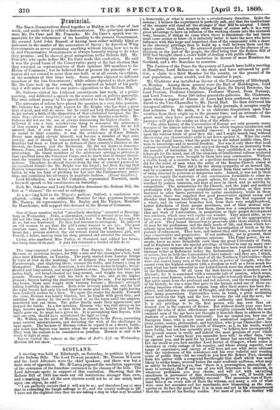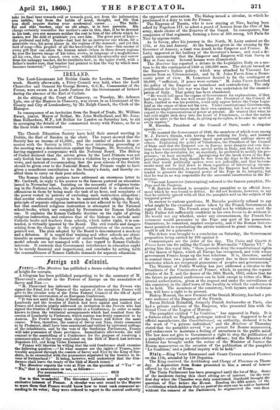SCOTLAND.
A meeting was held at Edinburgh, on Saturday, to petition in favour of the Reform Bills. The Lord Provost presided ; Mr. Duncan M`Laren and the Lord Advocate were the chief speakers ; and there was but a faint note of opposition. Mr. M'Laren proposed the resolution approving of the extension of the franchise contained in the clauses of the bills. The Lord Advocate spoke in support of this resolution. Showing that the Reform Bill of 1832 has made our old institutions stronger than ever, and remarking that all the new electors could not be of one mind, bent upon one object, he said
I am perfectly certain that it will not be so' and therefore I say at once that in extending the burgh suffrage to 61., and the county suffrage to 101. I have not the slightest idea that we are taking a step in what may be called a democratic, or what is meant to be a revolutionary direction. Quite the reverse; I believe the experiment is perfectly safe, and that the institutions of the country will stand all the stronger if that Bill be adopted. I think this is quite clear, that, keeping other things of course safe, it is a very great advantage to have an infusion of the working classes into the electoral body, because, if things do come when there is discontent—for bad times must come sooner or later—it is infinitely better to have the men who have influence with this large and important class of the community with a share in the electoral privilege than to build up a wall between them and the upper classes." (Cheers.) He advanced good reasons for the absence of en- thusiasm on the part of the people, the chief being that the Reform Bill of 1832 had brought about a cooler-habit of dealing with public affairs.
The meeting also passed a resolution in favour of more Members for Scotland, and a 40s. franchise in counties.
The Justices of the Peace for the county of Lanark have held a meeting at Hamilton, Lord Belhaven in the chair, and have advanced by peti- tion, a claim to a third Member for the county, on the ground of its vast population, great wealth, and the taxation it pays.
Mr. Gladstone was installed as Rector of the University of Edinburgh on Monday. Among those present were the Earl of Haddington, Lord Ardmillan, Lord Belhaven, Mr. Stirling of Keir, Sir David Brewster, the Lord Provost, Professor Christison, Professor Mansel, Dean Ramsay, and Lord Neaves. Some 200 ladies graced the galleries. Mr. Gladstone, upon whom a degree of Doctor of Laws had been conferred, was intro- duced to the Vice-Chancellor by Mr. David Hall. He then delivered his inaugural address. As reprinted in the daily journals, it occupies nearly four columns. In the main, it is an elaborate disquisition upon Uni- versities from their origin up to the present time, and an estimate of the great work they have performed in the progress of the world. Some passaged will give the reader an idea of the whole :—
"The older history of the Universities of Europe not only presents many features of the utmost interest, but upon the whole inspires satisfaction and challenges praise from the impartial observer. I might detain you long upon the various kinds of good they did ; and I might search long without discovering any characteristic evils to set down against it. What the castle was to the feudal baron, what the guild was to the infant middle class, they were to knowledge and to mental freedom. Nor was it only there that local culture received local shelter, and enjoyed through them an immunity from the assaults of barbarism in its vicinity ; they established, so to speak, a telegraph for the mind, and all the elements of intellectual culture scattered throughout Europe were brought by them into near communion. Without a visible head, or a coercive law, or a perilous tendency to aggression, they did for the mind of man what the unity of the Roman Church aimed at doing for his soul. They did it by the strong s pathy of an inward life, and by a common interest and impulse, almost m their nature incapable of being directed to perverse or dangerous ends. Indeed, it was not in their nature to supply the materials of any combination formidable to other so- cial powers acting each in its proper sphere, for they were on every side watched by jealous interests, and kept at once in check and in activity by competition. The monasteries for the Church, and the legal and medical professions with their special establishments of education, as they were matured in after times, prevented an undue ascendancy, while in these seats alone there was supplied that good preservative against excess and disorder that human knowledge was in them from the first regarded as a whole, and its various branches had, from their very neighbourhood, better definitions of their proper provinces, and of their mutual rela- tions. In whatever light we view them, there was a completeness in the idea and work of Universities, in proportion as their proper development was attained, which may well excite our wonder. They aimed alike, as we have seen, at the preservation of all old learning, and at the appropriation of all new. They bound themselves to prosecute alike those studies which fit men for the professions and the daily needs of life2 and those which ter- minate upon man himself, whether by the investigation of truth or by the pursuit of refinement. They bore, and indeed they still bear, a character at once conservative and progressive. If not uniformly, yet in general, their influence tended to mitigate extreme opinions. The Papal power, for ex- ample, knew no more formidable curb than the great University of Paris, and in England it was the special privilege of Oxford to rear up many cen- turies ago very eminent men of the class who have been well described by a German writer as Reformers before the Reformation. I speak now of men of action ; but in both the Universities I have named—and they are, I think, the two placed by Huber at the head of all the Northern Universities—there were also reared many men of the first order in power of thought, who dis- cussed even the highest subjects with a freedom as well as a force much be- yond what has been tolerated in the Latin Church since the alarm and shock of the Reformation. Of all these the best-known name to modern ears is Abelard ; for it is associated with a romantic tale of passion, which some, and even some famous, writers have not thought it beneath them to degrade. But quite apart from the profound and sad interest, and the warning lessons of his history, he was a man that gave to the human mind one of those en- during impulses whose effects remain long after their source has been for- gotten, and influence the course of thought, and through thought of action, after many generations. Universities were, in truth, a great mediating power between the high and the low, between the old and the new, be-
tween speculation and action, between authority and freedom It is my privilege to be the first person who has ever thus ad- dressed you in the capacity of Rector. But without doubt your ears have caught the echo of those affectionate and weighty counsels which the most eminent men of the age have not thought it beneath them to address to the students of a sister Scottish University. Let me remind you how one of European fame, who is now your and my academical superior—how the great jurist, orator, philosopher, and legislator, who is our Chancellor—how Lord .Brougham besought the youth of Glasgow, as I, in his words, would more feebly, but not less earnestly pray you, to believe how incomparably the present season is verily and indeed the most precious of your whole lives,' and how every hour you squander here will,' in other days, rise up against you, and be paid for by years of bitter but unavailing regrets.' Let me recall to you how another Lord Rector of Glasgow, whose name is cherished in every cottage of his country, and whose strong sagacity, vast range of experience, and energy of will were not one whit more eminent than the tenderness of his conscience and his ever wakeful and wearing sense of public duty—let me recall 03 you how Sir Robert Peel, choosing from his quiver with a congenial forethought that shaft which was most likely to strike home, averred before the same academic audience, what may as safely be declared toyou, that there is a presumption, amounting al- most to certainty, that ff any one of you will determine to be eminent, in whatever profesaion you may choose, and will act with unvarying steadiness m pursuance of that determination you will, if health and strength be given to you, infallibly succeed.' The mountain-tops of Scot- land beho.d on every side of them the witness, and many a one of what were once her morasses and her moorlands, now blossoming as the rose, carries on its face the proof that it is in man and not in his circumstances that the secret of his destiny resides. For most of you that destiny will take its final bent towards evil or towards good, not from the information you imbibe, but from the habits of mind, thought, and life that
you shall acquire during your academical career The faith- ful and able teacher, says an old adage, is in loco parentis. His charge certainly resembles the mother's care in this, that, if he be devoted to his task, you can measure neither the rest to him of the efforts which he makes, nor the debt of gratitude you owe him. The great poet of Italy— the profound and lofty Dante—had had for an instructor one whom, for a miserable vice, his poem places in the regions of the damned ; and yet this lord of song—this prophet of all the knowledge of his time—this master of every gift that can adorn the human mind—when in those dreary regions he sees the known image of his tutor, avows, in language of a magnificence all his own, that he cannot, even now, withhold his symyathy and sorrow from his unhappy teacher, for he recollects how, in the upper world, with a father's tender care, that teacher had pointed to him the way by which man becomes immortal." (Applause.)



























 Previous page
Previous page